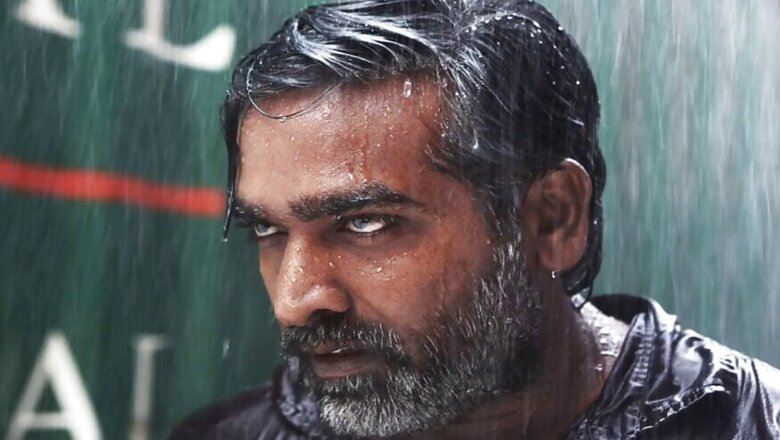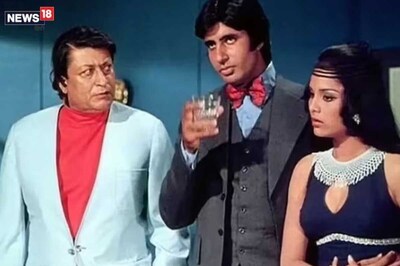
views
This may be 2017, the era of cutting-edge technology, but Tamil cinema is still to come of age, and the difference will appear glaring if one were to watch Bollywood productions, which have far greater finesse and are miles ahead as far as shot compositions, mounting and editing go. In short, a film emerging out of Mumbai looks amazing. In comparison, Tamil movies tend to look like poor cousins.
But, I must give it to Tamil cinema for its uniquely refreshing plots and its courage to still think of taking its camera to the countryside and asking its actor to get into a “veshti" and shirt, and its actress to wear a sari or half sari. And I have used these yardsticks to list five Tamil films that tugged at my heart in 2017. They may not have been up there with technique or even performance, but they had refreshing stories to tell us.
Vikram Vedha
If I was asked to name just one great Tamil movie in the entire year, I would not have batted an eyelid before putting my finger on the husband and wife directorial team, Pushkar -Gayathri's Madhavan-Vijay Sethupathi starrer Vikram Vedha. The helmers' ability to adapt the age-old, but timeless folklore of King Vikramadityan and Vedhalam (Betal) to the crime and criminality of modern times made Vikram Vedha sparkle. The narrative is crisp, the craft flies, and the subtlety seen through the imaginative choice of colors (white, black and grey and the way they change on the costumes of the characters) as well as the unbelievable casualness of Vijay Sethupathi as gangster Vedha push the picture to the point of perfection. Or almost. In this cop-chase-goon plot, Vedha's each meeting with the encounter specialist, Madhavan's Vikram (who brags all the time about his prowess) confuses and confounds the man in uniform -- much like the manner in which Vedhalam foxed King Vikramadityan. Riveting performances by Madhavan and Sethupathi help transform a tale of treacherous battle into a bewildering puzzle – with Vedha shooting moral questions, not bullets, at Vikram. Also, one should not miss the message: the film lambasts without mincing words the horrors of extra-judicial killings in India, something the nation heard for the first time during the 1970's Emergency.
Theeran Adhigaram Ondru
I had no great expectation when I walked into the auditorium screening H. Vinoth's latest cop story, Theeran Adhigaram Ondru, that had Karthi in khaki. He had played policeman in an earlier work, and there have been so many cop pictures in Tamil that frankly I could not think of anything different that Vinoth could possibly offer. But, surprise of surprises, the young director (who did earlier give us a reasonably clean movie called Sathuranga Vettai) came out with something which was dramatic without being too exaggerated. Based on a true crime story that rocked Tamil Nadu and other southern states in the 1990's and early 2000, Theeran Adhigaram Ondru is all about a notoriously criminal tribe from Rajasthan plundering and killing on some of the lonely highways. These masked men were brutal to the last word; they did not just rob, but also murdered men, women and children in cold blood. Unlettered and unsophisticated in this game, these men (who have been compared to the thugs who operated in 19th century Bengal and other neighboring areas until Lord William Bentinck finished them off after they had had a free run for 600 years with fearless impunity) left behind their fingerprints – which eventually help Karthi's Theeran to eradicate their menace. Wonderfully researched with the help of the very man, the then Inspector-General of Police, S R Jangid – who led the assault on the criminals – the film is narrated with gripping precision. There is never a dull moment here, and the plot progresses with admirable ease, taking us to several places in Haryana, Delhi, Uttar Pradesh, Madhya Pradesh and the sands of Rajasthan, where the final battle is fought between Theeran and the murderous gang. The movie picks up additional stars, because Karthi has finally come clean of some of his boringly irritating manners.
Aramm
I was impressed to see actress Nayanthara as a no-nonsense District Collector in Gopi Nainar's Aramm. The film is all about her, and Aramm deals with a huge present-day problem, that of deep, unused borewells, which are bone-dry and left uncovered by callous contractors. The openings of these wells are at ground level, and that is what makes them so dangerous. One fine morning, Nayanthara's Madhivadhini (an IAS officer) gets a phone call about a four-year-old village girl, Dhansika, having fallen into such a pit, about 90 feet deep. The officer rushes to the spot to be confronted by what looks like insurmountable problems: a broken-down fire engine blocking the only narrow road to the village, hysterical parents of the girl, angry villagers baying for the blood of the guilty, ruthless politicians and an insensitive media. What is most remarkable about Aramm is its ability to stay on track for those 10 or 12 hours when Dhansika lay trapped in the dark well – although I did at times feel the background score a little too disturbing. No costume change for Nayanthara, who is seen throughout the movie (except for brief periods when she is answering to a charge-sheet in a Chennai office) in the same sari. Subtle and subdued, she goes about taking one risky decision after another (in the end, Dhansika's brother is lowered into the well to get her out) most stoically, and I am sure the actress has certainly carved a fine niche for herself with this film.
Kuttram 23
Arun Vijay plays Sherlock Holmes and Thambi Ramaiah his Dr Watson in director Arivazhagan’s gripping murder mystery, Kuttram 23, which despite tackling a whole lot of issues, like uncontrollable male ego, blackmail and unethical medical practice, remains firmly grounded and believable. Essaying a cop, Vetrimaaran (Vijay) is asked to probe the strange death of Jessica, the wife of a leading television channel owner. She is found dead along with a church priest one night. In fact, the movie begins on an eerie night outside a deserted church where we see Jessica getting off a fancy car and walking up to the priest for confession. No sooner had she confessed than the priest is murdered, and a panicky Jessica tries to flee. Coincidentally, the first to walk into the scene of the crime is Thendral (a beautiful Mahima Nambiar), who becomes the obvious first reference of police investigation. I must laud the director, who steers his work from needless romantic distractions with just about one song, and enriches his work with taut editing (by Bhuvan Srinivasan) to get Kuttram 23 on a much higher plane than most other Tamil films. With fantastic inter-cuts and minimal background score (what a relief), Kuttram 23 (referring to the 23 male chromosomes that help a woman conceive a child) may be seen as a powerful indictment of criminal methods used in the medical practice of artificial insemination.
Manusangada
Amshan Kumar's Manusangda is a power-packed tale of a horrendous social evil. The movie details Dalit discrimination, a kind of prejudice which India has been witnessing for centuries. While such intolerance in America is visible, since it exists between the blacks and whites, it is devious and hidden in India. For, nobody can really tell the difference between a Dalit and a high-caste or higher-caste Hindu. They all look the same. So, the hatred which exists between these two sections, Dalits and non-Dalits is camouflaged , and often the injustice perpetrated by one on the other is very well disguised. Manusangada, based on a real 2016 incident in a village not very far from Chennai (with its educated elite and cosmopolitan crowds), narrates the story of a youth, Kolappan (played by Rajeev Anand), who is woken up one morning with the news of his father's death. He rushes from Chennai, where he is working, to his home to meet his grieving mother and perform the last rites. But what shakes him more than his father's untimely death is the social obstacle placed by caste Hindus on the road to the burial ground. Although the Dalits are free to use the main thoroughfare in their day-to-day activities, they are forbidden to take their dead along this road. Instead, they have to use a rough path, strewn with thorns and wild plants, to carry their dead bodies to the burial place. Kolappan, young and haughty and full of modern ideas, decides that he will take his father's body only through the main thoroughfare, and when hostility and protests raise their ugly heads, he moves the Madras High Court with a writ. The court orders the village administration and the police to make sure that Kolappan's father gets a decent burial. But he does not.
(Gautaman Bhaskaran is an author, commentator and movie critic)


















Comments
0 comment